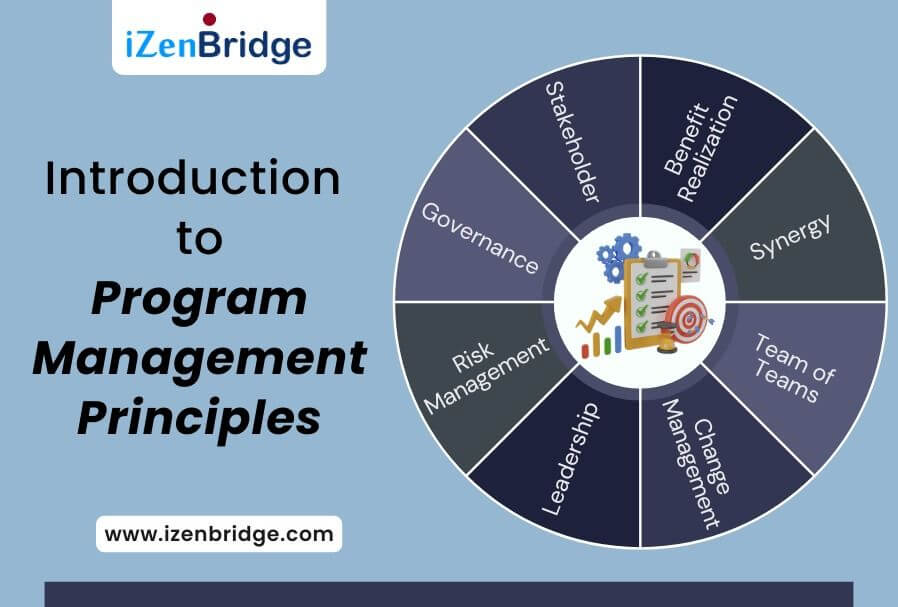

Program management is a complex discipline that requires a solid understanding of various principles to ensure successful program delivery. These principles are crucial for those preparing for the PgMP (Program Management Professional) exam, as they form the foundation for effective program management practices. Regardless of the industry, these principles guide program managers in making decisions that align with organizational goals, stakeholder expectations, and benefit realization.
This blog explores the core Program Management Principles and how they can help you prepare for the PgMP exam, ensuring you understand the mindset and approach needed to manage large, complex programs effectively.
Stakeholders are individuals or groups affected by the program or who perceive themselves as being impacted by it. A key responsibility of the program manager is to ensure that stakeholder expectations are aligned with the program’s objectives and the business benefits it seeks to deliver. This alignment is crucial throughout the program’s life cycle and must be proactively maintained.
A good approach is to regularly reassess your engagement strategy, ensuring that stakeholders’ needs are met and that they are kept informed of the program’s progress. The PgMP exam often tests your ability to adapt to changing stakeholder expectations while still ensuring alignment with the overall program objectives.
The principle of Benefit Realization emphasizes the importance of delivering value through the program. It’s not just about producing deliverables but ensuring that these deliverables generate benefits aligned with the organization’s strategic objectives.
A program manager must keep the focus on benefits rather than just deliverables. The ability to identify, measure, and sustain these benefits is critical, and this principle forms the basis of many questions in the PgMP exam.
The essence of program management lies in creating synergy—bringing together multiple projects or components to achieve benefits that could not be realized independently. Program managers must focus on integrating the activities of component projects to maximize overall program benefits.
Effective synergy management allows different projects to collaborate, share resources, and innovate together. The PgMP exam often includes scenarios where you need to balance different life cycles (predictive, adaptive) while ensuring overall program success.
Program management often involves managing a network of teams working across various components. The principle of Team of Teams focuses on creating an interconnected structure where teams can collaborate vertically and horizontally, working toward a common strategic goal.
In the PgMP exam, you may encounter questions about managing large, complex programs with multiple teams and ensuring they are aligned. This principle also ties closely to leadership and change management, both of which are core to the PgMP curriculum.
Change is inevitable in any program, and effective Change Management is critical to ensuring that the program remains aligned with its objectives, even as internal and external environments evolve. Program managers must adapt to these changes while maintaining a focus on benefit realization.
Managing change effectively requires integrating new information, adjusting plans, and ensuring that all stakeholders and teams are aligned with the changes. The ability to adapt and guide a program through change is a critical skill tested in the PgMP exam.
Effective leadership is the cornerstone of successful program management. As a program manager, you are expected to inspire, influence, and guide your teams and stakeholders toward achieving program goals.
In a program management context, leadership involves both influencing stakeholders and guiding multiple teams across different projects. The PgMP exam evaluates your understanding of situational leadership, where different scenarios require different leadership styles and approaches.
Risk is a natural part of program management, and effective Risk Management ensures that uncertainties do not derail the program from achieving its objectives. Program managers must be proactive in identifying, analyzing, and mitigating risks to keep the program on track.
Program managers must create a risk-aware culture within their teams and ensure that risks are managed at both the component and program levels. You may also be tested on your ability to escalate risks to senior management when necessary.
Governance ensures that the program is executed according to organizational policies, complies with regulatory requirements, and achieves its strategic goals. It provides oversight and ensures accountability throughout the program life cycle.
In the PgMP exam, governance often overlaps with other principles like benefit realization, change management, and risk management. You’ll need to understand how governance structures are applied across the program life cycle and how they support effective decision-making.
Mastering these Program Management Principles is essential for success in the PgMP exam. Each principle—from Stakeholder Engagement to Governance—forms the foundation of program management, providing the mindset and tools needed to manage complex, large-scale programs effectively.
These principles are interconnected and serve as the guiding force behind every decision and action in a program. By understanding and applying these principles, you’ll be well-prepared to answer the wide range of questions you’ll encounter in the PgMP exam.
If you’re preparing for your PgMP certification and need support, be sure to check out our comprehensive PgMP exam preparation programs. We offer self-paced learning, live mentoring, and application guidance to help you pass the PgMP exam efficiently and confidently. Explore our PgMP exam preparation offerings today!